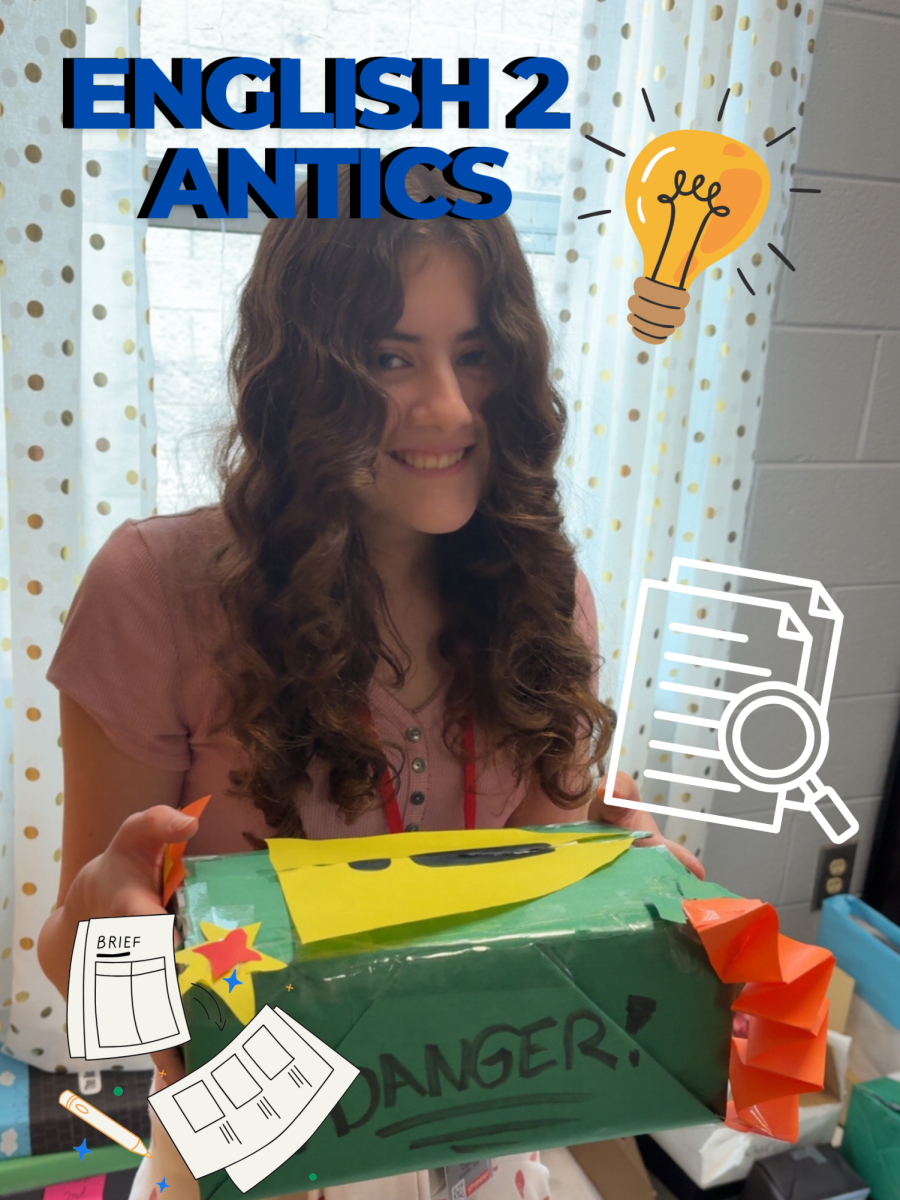
The Education Board of South Carolina has approved a new cell phone policy banning students from using their cell phones throughout the day, districts are permitted to include non-instructional periods such as class changes and lunch blocks. All schools must adhere to these regulations or stricter, if not funding will be cut, it will take effect in January 2025. We interviewed a student and a teacher to see how they felt about the phone ban and hear their thoughts on how it will affect daily school life.
First, we interviewed Ariana Beauvais, a sophomore at Hillcrest.
- How do you feel about the current phone policy, do you think it’s effective?
“I think the phone policy is effective to an extent. I feel like a lot of kids will either ignore the policy or find ways to get out of it. I feel like it also just distracts a lot of kids because they’re so attached to their phones, it causes them to feel like their freedom is being cut off when their phone is taken away and it can definitely cause a lot of tense feelings especially if a teacher writes them up. But I feel like it has its positives and it’s better than having your phone completely taken away, however, I do feel like it’s not entirely efficient or effective.
- Do you think the phone ban will negatively or positively affect students and teachers?
“ I think it depends on the people. I feel like if it’s a person who’s more active on their phone, more attached to their phone, it will be more negative, or someone or has mental issues because if something were to ever happen and they needed to text someone or something like that while they’re in school, I know a lot of people go to the bathroom [with their phones] if they’re having problems. I feel like completely having their phones taken away takes away effective means of communication and I feel like it can also cause a lot of anxiety like if they’re waiting for news from their family or something outside of school.
- Some parents are concerned they won’t be able to contact their child in case of an emergency, do you think this is a valid concern?
“One hundred percent. I know a lot of administrators say you could call the front office, but there are some personal things that I know parents wouldn’t want the school to know, same with the students. And I feel like if it was an emergency that had to go through multiple people, that would be anxiety and fear-provoking,”.
- What would be your ideal phone policy?
“ I don’t want to say complete freedom because that could be very chaotic. Again, it feels very subjective to the class and to the students. I feel like the policy before the ban on not having phones in class worked. Just because it was up to the students, if they really wanted their grades to matter and if they were on their phones too much in class it affected their grades and they would start paying more attention in class. It just created a sense of responsibility rather than [the new policy] is like you’re always under control and you’re always being patrolled rather than being given the freedom to make your own choices that have their effects on you. Which I feel like is a very important part of being in school is making your own choices and holding yourself to your own responsibilities,”
- Do you have anything you want to add about the phone policy?
“I also feel like we need to be spending our money on metal detectors and other protective services for the school rather than taking phones away, which isn’t as effective for safety. They claim metal detectors are so expensive but then take the funding they could use for it and instead take away phones when there are much easier and no expense options for that issue,”.
Ariana’s answers may mirror the feelings of many students who feel like their choices and freedoms are being taken away. They also voice the concerns of both students and parents who feel unsettled about their child not being able to reach them in case of an emergency or vice versa. As well as if enacting a phone ban is where resources are most needed right now. We also interviewed Mr. Berry who teaches Law Education, to see how some teachers feel about these new rules.
- How do you feel about the current phone policy, do you think it’s effective?
“I think if everyone would follow it, it would be incredibly effective. The problem that you get into, just to speak candidly as a law teacher, there’s no law that you can write that’s going to solve any particular legal problem. We can write a law against murder and that doesn’t mean people are going to stop murdering. There have been laws against murder forever. We can write a law against having cellphones in class and somebody’s going to because they don’t care. Now is it effective in the sense of teachers enforcing it? Yeah, if teachers enforce it the right way, if you come to my class it’s enforced, kids aren’t on their phones. By and large, it’s been positive because kids are doing their assignments in class like they’re supposed to be. It’s one less distraction for them to deal with, but that doesn’t prevent any kid from playing a video game. I’ve had to go to the back of my class because a kid was playing Snake or something like that. It’s not going to prevent stuff like that, kids always find a way to do something. No policy or law can be one hundred percent effective, but if it’s enforced right it can be pretty effective,”.
- Do you think the phone ban will negatively or positively affect students and teachers?
“ I think if students take it seriously it’s a positive effect and the same for teachers. If they take it seriously it’s a positive effect. I think it’s a good idea in principle, if people enforce it and they’re serious about it, it’s going to reduce distractions. Anytime, we can reduce distractions on an issue affecting education in the classroom, it’s a good thing. Now are there negatives to this, yes, potentially. The law also stipulates that unless we get exceptions students are not able to use cell phones for educational purposes. That takes away potential awards teachers could give out like if you finish your work ahead of time you listen to some music, that’s something we’ve been using cell phones for a long time. Today I had students working on vocab, but I can’t, legally speaking, allow them to do that.
- Some parents are concerned they won’t be able to contact their child in case of an emergency, do you think this is a valid concern?
“I don’t think they’ll be able to contact their child as directly, that’s true. But not being able to get into contact with your kid is a truly valid concern? No not really and I’ll tell you why. I’m a child of the ’90s, I went to elementary and middle school in the ’90s and early 2000s. We had flip phones that didn’t even have cameras on them yet. I also remember my mom wasn’t calling me in the middle of class or sending me text messages. If you wanted to type out a text message it was arduous, if she wanted to know what was going on at my school, she could just call the front office. It was not like you couldn’t contact people if you wanted to. You weren’t tethered to your kid constantly. Which if we’re being a little controversial, is another distraction in a kid’s life. Some parents, good, bad, or otherwise, are in contact with their kids all the time, that’s a distraction. They need to be paying attention to what’s going on in class and finishing their assignments, but they’re texting Mom and Dad or their friends. That’s part of the reason why this law is there, it’s a distraction reduction law in intent. On the other side, I understand there’s a heightened concern over attacks on schools and lockdowns. I don’t have kids, but I have empathy for the situation parents would find themselves in if there were some sort of active threat situation at school, I would want to get in contact with my kid. It’s a double-edged problem, but is it truly valid for the vast majority of school days that your kid is going to experience that aren’t active school threat situations, which by the way are incredibly rare? It’s not something I would go around being paranoid about. For the vast majority of school days, do they need that tether to their kids, probably not.
- What would be your ideal phone policy?
“My ideal phone policy would be one that kids follow. We’re getting into the world of make-believe, but my ideal phone policy already existed. You know you’re not supposed to be on your phone, it’s been that way for a long time, and this isn’t new. It’s not like we came out the last couple of years and said ‘By the way you guys can’t have your phones,’. The rule has always been that even when I was in high school, you could just have your phone out and be texting. The difference is, it’s now a matter of the state, that we have to punish kids for having their phones out because frankly, some kids can’t control themselves and have it out constantly. Again it’s a classroom distraction destruction statute. It’s never been the policy that you can have your phone out willy-nilly all the time. Certainly, for the last twenty years, it’s been against the law. However, I would like the latitude as a teacher to be able to make that call. This situation that we’re in educationally calls for cell phones, if we need to use it to record a skit or project presentation. There are places and times for phones and the technologies they provide us with are amazing and very useful. It gives us access to the internet, the most comprehensive compendium of human knowledge that has ever existed so there’s room to appreciate the phone and use it. In that sense, I don’t like the idea that we’re putting in this absolute restriction, at least in the way I read the statute. But a properly enforced policy where students accept when a teacher says they can’t have their phone out and they follow it would be great,”.
- Do you have anything you want to add about the phone policy?
“I think it is unfortunate that we have gotten to a point where the state legislature has to step in. And there’s going to be people that say the state legislature didn’t need to step in. This is not a matter that they needed to create a law for, and it is maybe it isn’t. Greenville County saw this coming, that’s why we had the policy before the law and it was pretty restrictive anyway. But I do think, it is indicative that we ever got here, that society is not able to police itself, that the legislature felt like it needed to step in, it’s kinda sad really. There’s nothing that we’re going to do as adults, even the law that’s going to stop kids from being distracted by stuff. How effective it’ll be, I guess we’ll see,”.
Mr. Berry provides a very nuanced take on cell phones that explains why he, as a teacher, doesn’t want them completely taken away in the classroom but also sees why the district does. As a person growing up when mobile phones were becoming more prominent in everyday life, he knows how taking them away might affect schools and how parents and kids will have to interact now. The new policy doesn’t allow much middle ground for teachers to decide how students will be able to connect with their phones whether that be for educational purposes or a reward. If teachers would like permission to incorporate phones in the classroom, they will need written permission from the district superintendent.
Phones and other forms of technology are undeniably a part of everyday life for students and teachers in school, but should they be? The state is now stepping in to say that they shouldn’t be. The effects of this new policy will be felt in the second semester when students will not be able to interact with their phones during the school day. We, as a state, will find out if this new policy will hurt or help students and teachers.




















Kelli Rish • Sep 16, 2024 at 8:38 pm
If things went back to the way it was when us parents went to school no laptop computers that u school’s have provided for the kids to take home to use for there personal gain and not school work and only allow the phones to be used for emergency only then maybe the kids would learn better